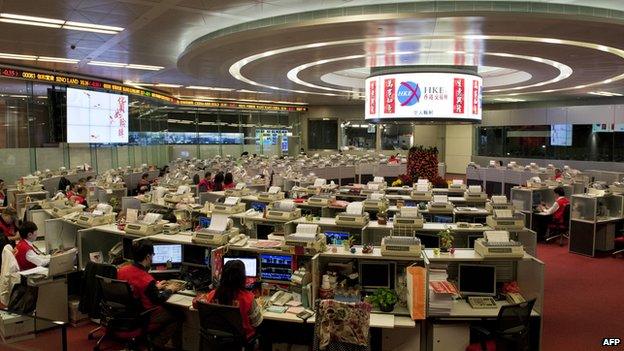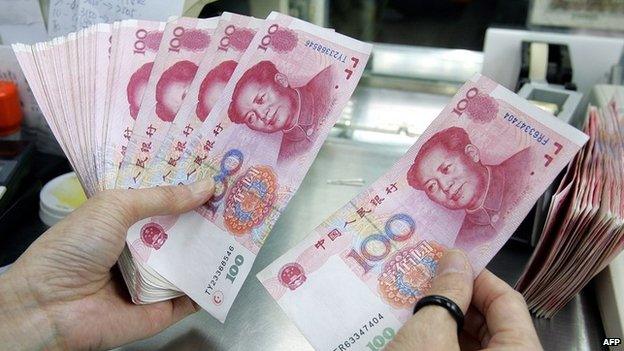Chinese stocks fall despite new stimulus measures
- Published

Chinese stocks fell despite government stimulus which cut reserve requirements for the second time this year.
The People's Bank of China (PBoC) reduced the amount of money banks must set aside as reserves by one percentage point in a bid to spur more lending.
The announcement on Sunday came in the wake of data showing the country grew at its slowest pace in six years.
Hong Kong's Hang Seng fell 2.02% to 27,094.93, while the Shanghai Composite lost 1.64% to 4,217.08.
Mark Williams, chief Asia economist at Capital Economics, said China acted because "downside risks to growth appear greater now.
"The decision is a response to the weakness of recent economic data. Most of the activity and spending data for March came in below consensus.
"Further reserve-requirement ratio (RRR) cuts are likely - perhaps another 150 basis points before the end of the year - along with at least one more cut to benchmark interest rates," he said.
Margin trading
China's latest RRR cut is the largest since the global financial crisis, and analysts say the move will inject about 1.2tn yuan ($193bn; £129bn) of liquidity into the financial system.
However, stocks in Hong Kong and Shanghai have been swinging between gains and losses as investors digest a separate move by Chinese regulators made late on Friday.
The China Securities Regulatory Commission said it would clamp down on the use of leverage in margin trading and allow funds to lend to short sellers.
This includes banning brokerages from using so-called umbrella trusts and the use of shadow financing, or unregulated accounts, for stock purchases.
Chinese stock markets have seen a rapid run up in value recently, causing concern among policymakers about excess leverage and speculation.
Shanghai's bourse has gained more than 80% in the past six months while Hong Kong's stock operator has become the world's largest.
"We don't see any solid foundation in economic data for recent stock market gains, but as long as policymakers are still easing, it is hard to see the rally petering out any time soon," Mr Williams said.
Rest of Asia
Stocks across the rest of the region were also mixed amid concerns about a possible disappointing US earnings season.
Wall Street had closed sharply lower on Friday, with the S&P 500 losing 1.1% and the Dow Jones falling 1.5%.
Japan's benchmark Nikkei fell 0.09% to close at 19,634.49 points while the broader Topix ended 0.4% lower at 1,582.68.
South Korea's Kospi closed 0.15% higher at 2,146.71 points.
Australia's S&P/ASX 200 Index fell 0.74% to close at 5,834.10 and New Zealand's NZX 50 Index fell 0.6% to 5,824.28.
- Published19 April 2015
